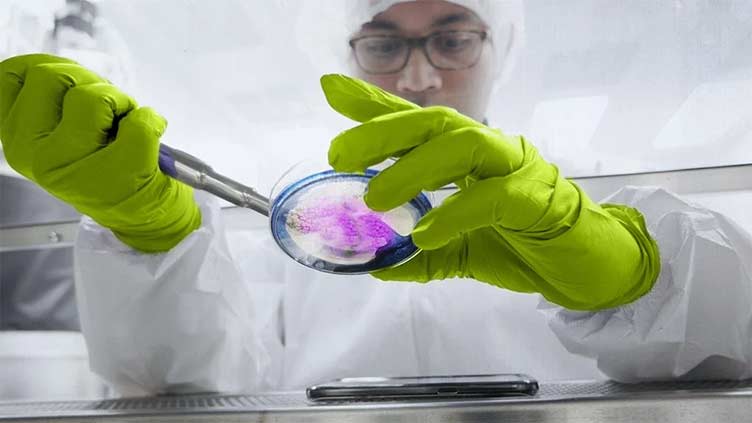Parkinsons may start from gut bacteria, researchers say

While researchers still do not know the direct cause of Parkinson's disease
ISLAMABAD, (Online) - Over 10 million people globally have Parkinson’s disease (PD) — a disease of the central nervous system affecting the body’s ability to move.
Parkinson’s disease can also cause dementia, depression, and difficulty with speaking and eating. There is currently no cure for this condition.
While researchers still do not know the direct cause of Parkinson’s disease, most believe it occurs through a combination of genetic and environmental factors.
Now researchers from the University of Helsinki have identified specific strains of the Desulfovibrio bacteriaTrusted Source in the gut, via an animal study, that may be the cause of Parkinson’s. Scientists believe their findings can help doctors screen for people who carry this particular bacteria, as well as use it as a target for potential therapies.
This study was recently published in the journal Frontiers.
What are Desulfovibrio bacteria?
“Desulfovibrio bacteria are (a) common bacteria in soil, water, (and) animal feces,” Per Saris, PhD, professor in the Department of Microbiology at the University of Helsinki and lead author of this study explained to Medical News Today. “We all encounter them via food, what we drink, and environmental contacts.”
“Typical for their metabolism is to produce hydrogen sulfide,” Dr. Saris continued. “They have the capacity to affect [the] production of magnetiteTrusted Source and dehydrogenases.”
Dr. Saris said they believe hydrogen sulfide plays a role when the inflammation it causes reduces the effectiveness of the body’s hydrogen sulfide detoxification system.
“In addition, magnetite, greigite, and [or] superparamagnetic particles — all induced by Desulfovibrio bacteria — may play a role, as well as the LPSTrusted Source [or endotoxin] of these bacteria causing inflammation,” he added. “Other factors may also be involved — more studies are needed.”
Previous studies show an association between Desulfovibrio bacteria and inflammatory bowel disease and ulcerative colitis.
The gut-brain connection and Parkinson’s disease
How could bacteria in the gut cause a disease of the brain?
According to Dr. Melita Petrossian, a neurologist and director of the Pacific Movement Disorders Center at Pacific Neuroscience Institute in Santa Monica, CA, it all has to do with the vagus nerve, which connects the gut with the brain.
“As (bacteria) metabolize food, they can create inflammation in the gut,” she explained to MNT. “They can cause (the) clumping together of a protein called alpha-synuclein. And those abnormal forms of alpha-synuclein can travel up the vagus nerve to the brain.”
Dr. Petrossian noted this is a more recent theory about the development of Parkinson’s via the gut.
“Prior to that, the theory was that environmental factors contributed to toxins entering through the noseTrusted Source, through the olfactory nerveTrusted Source to the olfactory bulbTrusted Source, and then directly back to the brainstem from there. So, these days, I think the consensus is that there’s probably a mix of where Parkinson’s comes from. For some people, it starts in the gut, and for others, it starts from the olfactory bulb.”
– Dr. Melita Petrossian, neurologist
Bacteria producing toxins and Parkinson’s
According to Dr. Saris, for years researchers suggested a toxin or bacteria producing toxins may cause Parkinson’s disease. This is because constipation often precedes — even 10 years before — the disease’s movement disorder symptoms, when the brain is already damaged.
“Therefore, it was quite (logical) to start to study bacteria as a reason for alpha-synuclein aggregationTrusted Source,” Dr. Saris added.
In 2021, Dr. Saris and his research team published research showing an association between Desulfovibrio bacteria and Parkinson’s disease.
“The results of our first study suggested that Desulfovibrio bacteria may, based on correlation to Parkinson’s patients, have something to do with disease initiation,” Dr. Saris explained.
“Therefore, we isolated Desulfovibrio strains from Parkinson’s disease patients and tested if they can induce alpha-synuclein aggregation and it turned out to be the case. Clearly, they are the best candidates presently recognized that may initiate development towards Parkinson’s disease.”
Additionally, a study published in March 2023 found Desulfovibrio bacteria increased disease severity for people with Parkinson’s disease.
Desulfoibrio bacteria vs. E. coli
In this study, Dr. Saris and his team used a worm study to further examine the correlation between Desulfovibrio bacteria and Parkinson’s.
The scientists collected fecal samples from 10 Parkinson’s disease patients and their healthy spouses. The samples were checked for Desulfovibrio bacteria and if found, were isolated. The worms were then fed either the isolated Desulfovibrio bacteria or strains of E. coli bacteria.
Upon analysis, scientists found the worms fed Desulfovibrio bacteria from Parkinson’s disease patients had significantly more and larger aggregates of alpha-synuclein than the worms fed either Desulfovibrio bacteria from healthy people or E. coli.
Additionally, researchers observed worms fed Desulfovibrio bacteria from Parkinson’s disease patients died in significantly higher amounts than worms fed E. coli.

